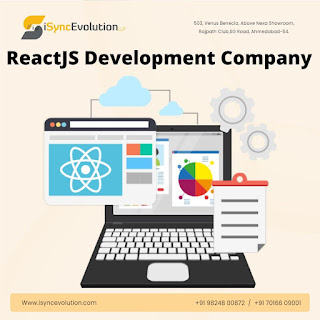What & Why We Should Use ReactJS
The most widely used front-end JavaScript library for building Web applications is React.js. There are several ways to refer to React.js, including React.js and just React. Reactjs is used by most Fortune 500 firms. Learn more about React.js (also known as React or Reactjs) in this article, along with the advantages it has over other JavaScript frameworks like Angular.
React.js: What is it?
An open-source JavaScript package called React.js is used to create user interfaces for single-page applications. It manages the view layer for both online and mobile applications. Reusable UI components may also be made using React. Jordan Walke, a software engineer for Facebook, developed React at first. In 2011 and 2012, Facebook's newsfeed and Instagram.com both used React for the first time.
With the aid of
React, programmers may build web applications that can modify data without
refreshing the page. React's primary goals are to be quick, scalable, and easy
to use. It only functions with the application's user interfaces. This relates
to the MVC template's view. It can be combined with other JavaScript frameworks
or libraries, such as AngularJS in MVC.
Simply React or
React.js are other names for React JS.
What features does React.js have?
Let's examine some of
React's key attributes in more detail.
> Among the React.js
properties are the following
> Declarative
programming is used in React.js.
> React.js is easy
to use.
> React.js is
based on components.
> React.js allows
for server-side
> React.js is a
big library.
> React.js is
quick.
> Learning
React.js is simple.
JSX
React uses JSX for
templating rather than standard JavaScript. JSX is a straightforward JavaScript
that supports HTML quoting and renders subcomponents using this HTML tag
syntax. React Framework JavaScript calls are generated from HTML syntax. We can
also use the original JavaScript language.
React Native
Facebook launched React's native libraries in 2015, bringing the react architecture to native apps for IOS, Android, and UPD.
React-native is a
framework for creating mobile apps that uses only Javascript. It utilises
React's identical concept and enables you to use/incorporate a robust mobile UI
library/declarative components. The essential UI building pieces used by most iOS and Android apps are also used here. The ability to use
components written in Objective-C, Java, or Swift is the best feature of
react-native.
Data flow in one
direction
In React, a
collection of immutable values are supplied as properties in the HTML tags of
the component renderer. The component cannot alter any properties directly, but
it can send a callback function to which we can make changes. The phrase
"properties flow down; actions flow up" refers to the entire process.
Object Model for
Virtual Documents
In-memory data
structures are created by React, which computes the changes made before
updating the browser. As opposed to react library, which only renders
components that really change, this permits a special feature that lets the
programmer to code as though the entire page is rendered on each update.
Why React?
The primary query
that now confronts us is "why use React?" There are a tonne of
open-source systems, like Angular, that make developing front-end web
applications simpler. Let's quickly examine React's advantages over competing
technologies or frameworks. It's challenging to dedicate time to learning a new
framework when the front-end world is constantly evolving, particularly when
that framework may prove to be fruitless in the long run. So I advise checking
out React if you're seeking for the next best thing but are feeling a little
bit confused in the framework jungle.
1. Simplicity
It's just easier to
understand ReactJS right immediately. React is incredibly easy to understand,
build a professional online (and mobile applications), and support thanks to its
component-based architecture, well-defined lifecycle, and use of simply plain
JavaScript. React makes use of a unique syntax called JSX that enables you to
combine HTML and JavaScript. Although JSX is significantly simpler to use, it
is not necessary; developers can still write in ordinary JavaScript.
2. simple to learn
React is simple to
grasp for anyone with a foundational background in programming, in contrast to
Angular and Ember, which are touted to as "Domain-specific
Languages," suggesting that they are challenging to master. You only need
a foundational understanding of CSS and HTML to react.
3. Native Method
Mobile apps can be
developed with React (React Native). Additionally, React is a staunch supporter
of reuse, therefore considerable code reusability is encouraged. We can
therefore create IOS, Android, and Web applications all at once.
4. Binding Data
One control point—the
dispatcher—manages the flow of data to components in React using one-way data
binding and the Flux application architecture. Large ReactJS apps with
independent components are simpler to debug.
5. Performance
There is no notion of
a built-in dependency container in React. To automatically inject dependencies,
you can utilise Browserify, Require JS, EcmaScript 6 modules that we can use
with Babel, and ReactJS-di.
6. Testability
Testing ReactJS
applications is quite simple. React views can be thought of as functions of the
state, allowing us to control the state we pass to the ReactJS view and observe
the results and any actions, events, functions, etc. that are triggered.
Conclusion
We believe you now understand what and why we should use React JS as an excellent framework.
React is a top-notch
framework that is deserving of your attention, just as Angular.
What then are you
still holding out for?
Hire React JS
developers in USA now to get going!
And keep in mind that
working with the finest iSyncEvolution Pvt Ltd firm is essential to creating a
successful React JS Website and application. Therefore, get in contact with us
right away to schedule a project consultation.
Contact
iSyncEvolution Pvt
Ltd
Services: Reactjs development in USA
Address: 503, Venus Benecia,
Above Nexa Showroom,
Opp Rajpath Club, SG Road, Ahmedabad-54.
Phn No: +91 98248 00872

Comments
Post a Comment